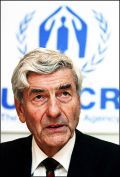AFP Interview: UN refugee chief says Sudan likely to grant Darfur autonomy
ABECHE, Chad, Sept 26 (AFP) — The Sudanese government has seen the writing on the wall and is likely to grant some autonomy to the violence-wracked Darfur region but the rebels should now do their bit to end the world’s worst humanitarian crisis, UN High Commissioner for Refugees Ruud Lubbers told AFP.
 Lubbers, who called for Khartoum to grant more autonomy to the region at the start of his current tour of Chad and Sudan, said Khartoum risked alienating the world if it continued its attacks in Darfur, one of the country’s most politically and economically marginalised areas.
Lubbers, who called for Khartoum to grant more autonomy to the region at the start of his current tour of Chad and Sudan, said Khartoum risked alienating the world if it continued its attacks in Darfur, one of the country’s most politically and economically marginalised areas.
“Sudan is under very great pressure,” he told AFP in an interview, adding that despite a “strange political atmosphere” it was increasingly buckling under world opinion.
“The international community is watching Darfur with tremendous interest. It’s not only Washington (which has termed the violence in Darfur as genocide) but also the Security Council and President Obasanjo of the African Union.
“Sudan knows that and I think will give Darfur limited autonomy under the framework of Khartoum’s territorial integrity.”
The United Nations has called Darfur the world’s worst current humanitarian crisis, and the United States and Germany have described the brutal campaign waged by Arab militias in Darfur as “genocide”.
An estimated 50,000 people have been killed and 1.4 million have fled their homes, including 190,000 that have sought refuge in neighboring Chad.
The UN Security Council has meanwhile passed a resolution which warns of possible sanctions, which Khartoum has termed “unjust and unfair” but promised to abide by.
The sanctions could have a huge impact on Sudan’s vital oil industry.
The bloodshed in Darfur began in February 2003 when rebels rose up against Khartoum to demand an end to the alleged marginalisation of their region — mainly peopled by black Africans and one of the poorest in Sudan.
The Sudanese government’s response to the uprising was to give Arab militias known as the Janjaweed a free rein to crack down on the rebels and their supporters.
The Janjaweed have been accused of murder, rape and torture and using women as sexual slaves.
But Lubbers said the two rebel groups fighting in Darfur had an equal responsibility to end the violence by burying their differences.
“The government has an uphill task because it has created the Janjaweed which is practising violence …. but my message to the rebels is you have achieved enough to sit down at the negotiating table, though you will be more successful if you agree on a first man to represent you.
“It is in your interest to start now. Darfur has bled enough.”
Lubbers also urged South African President Thabo Mbeki, a heavyweight in the continent, to join Nigerian President Olusegun Obasanjo’s efforts to end the spiral of violence in Darfur.
“Mbeki did many good things,” he said. “He is a great leader but if he gives his political weight to support President Obasanjo it would be a great thing. The world is looking to Africa to resolve its problems and President Mbeki’s voice is very important.”
The UN refugee chief expressed fears over rising local resentment in Chad — one of the world’s poorest and most arid nations — that the refugees were getting the lion’s share of their meagre water and firewood resources.
“It’s now more irritating than explosive but we have to prevent it from growing into an explosion,” he said, adding many Chadians now chafe at the refugees being better off than themselves.
